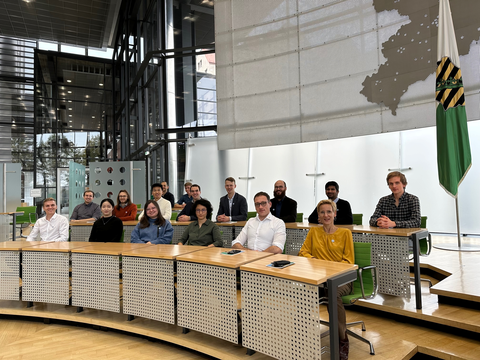Oct 27, 2023
Research Training Group visits the Saxon State Parliament
On October 19, 2023, the Boysen-TU Dresden Research Training Group had the opportunity to pay a (return) visit to the Saxon State Parliament after Hennig Homann, economic policy spokesman for the SPD in Saxony, had already visited the Research Training Group in June of this year(RTG reported). The host had also invited Dr. Gerd Lippold, State Secretary for Energy, Climate Protection, Environment and Agriculture at SMEKUL, and Karl Lötsch, Managing Director of the Saxon Hydrogen Competence Center KH2.
Link also: https://www.spd-fraktion-sachsen.de/wasserstoff-als-energietraeger-der-zukunft/
After introducing and welcoming an interested and eager Henning Homann, Prof. Hurtado presented the development of the Research Training Group since 2012 and, in great depth, the development of the topics, the cooperation with the Friedrich and Elisabeth Boysen Foundation and the networking of the Research Training Group. In his presentation of the Saxon hydrogen strategy, Dr. Lippold systematically addressed the four dimensions of the strategy: the executive, the political, the technical and the economic.

Spokesperson Prof Antonio Hurtado (left) gives an overview of the Research Training Group.
In the executive dimension, location issues and advantages are addressed, which are considered across three federal states (Brandenburg, Saxony-Anhalt, Saxony). Stakeholder processes, surveys of scientists, experts and network operators play a key role in this process. As a result, the Saxon Hydrogen Competence Center KH2 was founded as the first point of contact: https://hzwo.eu/project/kh2/
The political dimension shows that there are two borderline positions with regard to hydrogen: Hydrogen as an element of decarbonization in the energy transition ("building block") versus hydrogen as an alternative approach to the energy transition ("panacea"). In the Saxon hydrogen strategy, the short-term time horizon of the 2030 requirements is chosen, whereby State Secretary Lippold sees the greatest uncertainty in the path dependencies.
Everything is already known in the technical dimension, but scaling and cost reduction (economic dimension) are the current issues. Other solutions are currently cheaper than a solution that includes hydrogen. Dr. Lippold emphasizes that viable long-term business models will have to manage without permanent subsidies. Supply and demand are currently a three-dimensional "chicken and egg problem": "Who moves first? Producers, consumers or grid operators?".
In summary, Dr. Lippold emphasized the already high level of development in the field of hydrogen research and innovation. It is now particularly important to realize scalable and efficient solutions from this.
Karl Lötsch then introduces the Hydrogen Competence Center based in Chemnitz, which was founded in 2022. It acts as a mediator in the energy dialog and participation process and is a key point of communication between research, administration (ministries/advisors) and companies. The competence center helps with orientation, is a compass, information and contact point for the public, members of parliament and is there to answer questions about hydrogen.
Before the discussion and Q&A session began, a doctoral student from each cluster had the opportunity to present the cluster and its contribution to the goals of the Saxon Hydrogen Strategy in a 3-minute poster pitch, which was received with great interest.

Doctoral student John Jursch (TP G3) at the short presentation of Cluster G.
In the subsequent Q&A session, various questions arose, for example about future network operators, about the most economical transportation options for hydrogen, about planning periods that are often too long (quote "2030 is tomorrow"). It was confirmed that there is no contradiction between the Saxon and the national hydrogen strategy, conflicts are openly discussed in ministerial conferences. Many topics are European. For example, hydrogen production in the gigawatt range is also planned in Denmark.
Financial resources are limited. That is why Dr. Lippold called for Quote: "Do the math honestly!" This has often not been done in the past with other technologies. At the moment, there is no economical transportation of hydrogen by road and rail. Liquid hydrogen is currently not an option due to its poor efficiency; it is too expensive. At the same time, political leeway is becoming smaller rather than larger, so opportunities should be seized now.
The topic of social acceptance and the public's fear of change was also raised: the "simple" replacement of gas with hydrogen in the pipelines, i.e. "everything can stay as it is", is more likely to meet with approval. The accusation of the "champagne energy transition" should also be combated through communication.
The entire Boysen-TU Dresden Research Training Group would like to thank for the opportunity to visit the Saxon State Parliament, which ended with an interesting tour of the plenary chamber.

